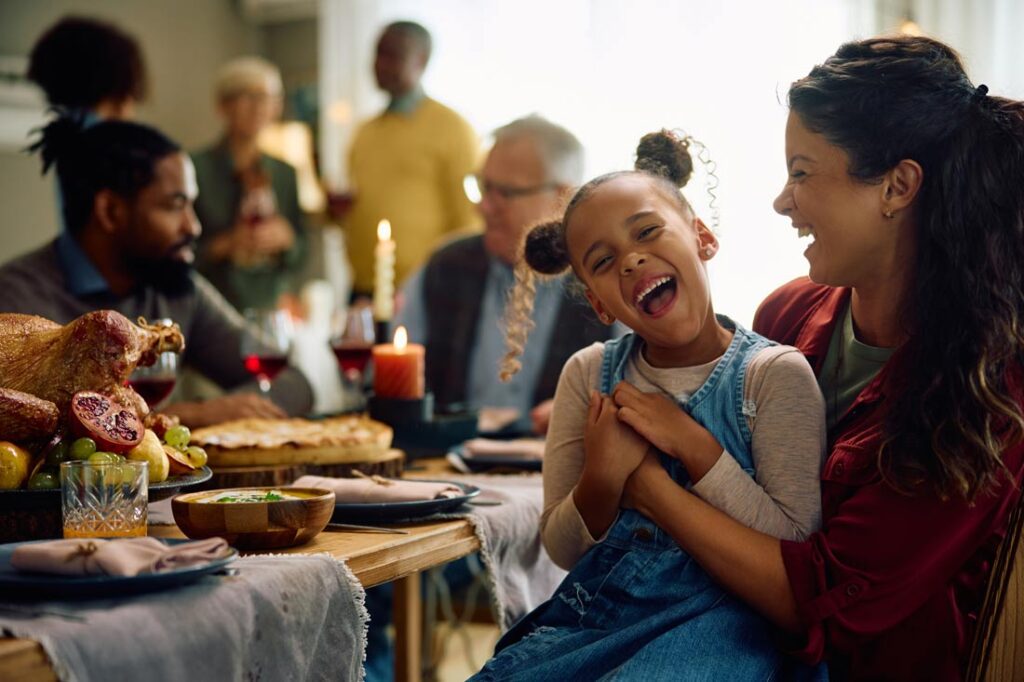The holidays are synonymous with parties, gatherings and potlucks where people come together for the shared purpose of enjoying diverse foods—not just in terms of dishes but also in flavors, ingredients and cooking methods. If done correctly, holiday potlucks are a thing of beauty, where friends invite friends, coworkers gather and neighbors open their homes to one and all. It is a cornerstone of the holidays worldwide and brings people to the table, literally and figuratively.
At a potluck, everyone is a cook, host and guest. Everyone cooks, everyone cleans when they get home and everyone gets to eat. But it begs the question: How can we ensure guests feel acknowledged, especially when it comes to something as personal as sharing a meal?
Alison M. Cheperdak, founder and president of Elevate Etiquette, a company that offers individual and group courses on modern manners and international protocol, advises on how to make your holiday potluck inclusive and welcoming for all your guests.
Share your inclusive holiday potluck plan with guests early on
Contrary to popular belief, potlucks—especially multicultural ones—do require a lot of planning to be successful. One of the first things you want to do is to share the concept or theme with everyone. If you host potlucks regularly, choosing a theme can be fun, but it is not required. It might even be inadvisable to suggest a theme for larger potlucks with lots of unknown guests so people don’t feel pressured to bring something they’re unfamiliar with.
One of the key things with any party, Cheperdak says, is to encourage guests to share any dietary restrictions. As a host, you should respect them without question and accommodate accordingly. “This means not asking a guest the reasoning behind the restriction nor the nature or severity of a potential adverse reaction if applicable,” she adds. “A host should treat a guest’s dietary restrictions as a private health matter not to be shared with others.”
This promotes the idea that the dinner party is a “safe place” without singling anyone out. Moreover, when it comes to putting together a holiday potluck menu that has a little something for everyone, not every single dish needs to meet every guest’s dietary needs. “However, it is important that there is enough for everyone so that no one goes hungry or is left feeling like an afterthought,” Cheperdak adds.
Food and décor ideas for your inclusive holiday potluck
When including a guest list of people from different ethnicities and cultures, it is important to be culturally aware. Potlucks are every home cook’s time to shine, so people would like to bring something they are good at making. “You can even encourage guests to make family favorites or traditional dishes from their culture and allow them to share the significance of such a dish if one is included in the menu,” Cheperdak says. This promotes understanding and helps educate everyone on cultural diversities in cuisine. While most people like to talk about the food they have made or brought, it is your job as a host to facilitate conversations that go deeper than just the “what” and “how” of a dish.
“For smaller parties, I recommend giving each special dish a try, so long as it is in keeping with any dietary restrictions. But if you suspect the dish will not be your cup of tea, take a ‘no thank you’ portion, which is a small amount to be polite but also not wasteful if you don’t finish much.”
People like potlucks because of all the different kinds of food they usually don’t eat together. So, as the host, it is up to you to encourage a feeling of community based on diversity—of both foods and people.
Another thing to note is that guests don’t always need to contribute to the meal. You can offer up the opportunity to bring flowers or décor items instead as long as they fit your overall theme. This works well for folks who don’t cook or don’t have the means to plan and prepare an elaborate dish. “Having the host provide the entrée and guests the accouterments is an approach that works well, too,” Cheperdak notes.
How to host a potluck that’s culturally inclusive? Facilitate authentic interactions
Now that you’ve planned the meal, how do you ensure everyone has a great time? As with any gathering, socializing and connecting are key, so prepare a few icebreakers to help keep the conversations going. Here are some general questions Cheperdak suggests keeping in mind when introducing guests who show interest beyond their culinary contribution to the party.
- How have you been spending your time lately?
- What are you excited about this season?
- What are some of your favorite holiday traditions?
- Have you read any great books lately that you could recommend?
At the end of the day, potlucks are about sharing—sharing space, food and company. With a little planning, thoughtfulness, open communication and a dash of creativity, your next potluck can be an inviting and inclusive place for all your guests.
Photo by Drazen Zigic/Shutterstock.com



